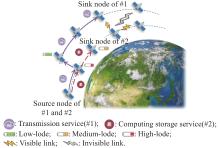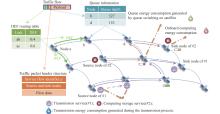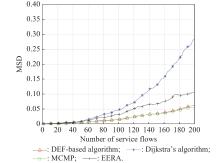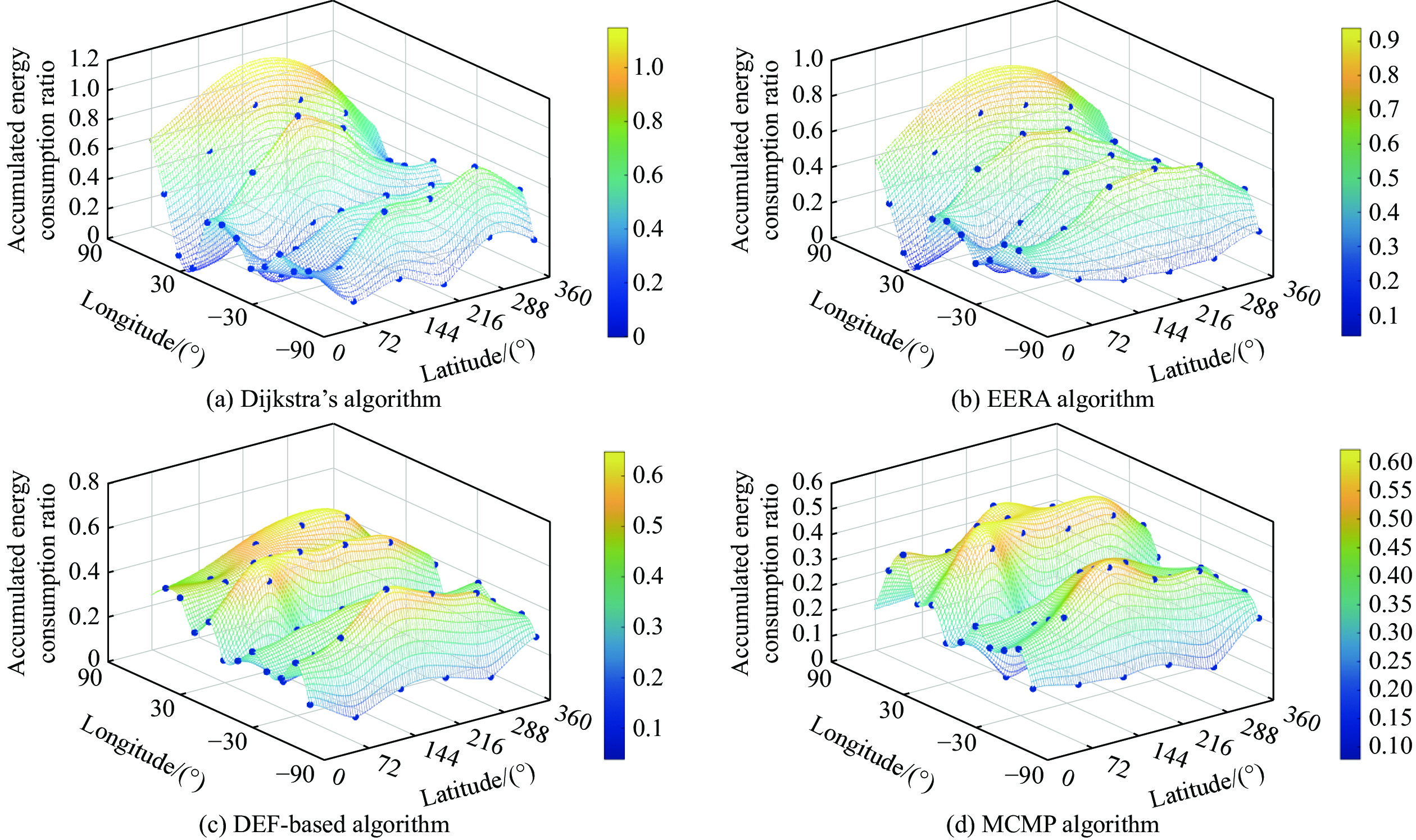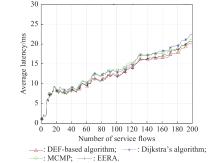| 1 |
FENG B, LI G L, LI G W, et al Enabling efficient service function chains at terrestrial-satellite hybrid cloud networks. Journal of IEEE Networks, 2019, 33 (6): 94- 99.
doi: 10.1109/MNET.2019.1800426
|
| 2 |
DENG R Q, DI B Y, ZHANG H L, et al Ultra-dense LEO satellite constellations: how many LEO satellites do we need? IEEE Trans. on Wireless Communications, 2021, 20 (8): 4843- 4857.
|
| 3 |
XU J, ZHAO Z T, WANG L, et al A novel deep reinforcement learning architecture for dynamic power and bandwidth allocation in multi-beam satellites. Acta Astronautica, 2023, 204 (2): 73- 82.
|
| 4 |
HU X, LIU S, CHEN R, et al A deep reinforcement learning-based framework for dynamic resource allocation in multibeam satellite systems. IEEE Communication Letter, 2018, 22 (8): 1612- 1615.
doi: 10.1109/LCOMM.2018.2844243
|
| 5 |
LAIO O S, CEZAR A R, EDUARDO C, et al Improving energy aware nanosatellite task scheduling by a branch-cut-and-price algorithm. Computers and Operations Research, 2023, 158, 106- 123.
|
| 6 |
WANG L, ZHENG J, HE C, et al Resource allocation in high throughput multi beam communication satellite systems. Chinese Space Science and Technology, 2021, 41 (5): 85- 94.
|
| 7 |
ZHANG L H Development and prospect of Chinese lunar relay communication satellite. Space: Science & Technology, 2021, 2021 (1): 14- 28.
|
| 8 |
ZHANG S H, CUI G F, LONG Y T, et al Joint computing and communication resource allocation for satellite communication networks with edge computing. China Communications, 2021, 18 (7): 236- 252.
doi: 10.23919/JCC.2021.07.019
|
| 9 |
HE H M, ZHOU D, SHENG M, et al. Mission structure learning-based resource allocation in space information networks. Proc. of the IEEE International Conference on Communications, 2021. DOI: 10.1109/ICC42927.2021.9500738.
|
| 10 |
JIA J, CHEN J, WANG X W, et al Energy-balanced density control to avoid energy hole for wireless sensor networks. Distributed Sensor Networks, 2012, 8 (1): 104- 107.
|
| 11 |
KIM T, KWAK J, CHOI J P. Analysis of low-latency virtual network resource reservation for LEO satellite network. Proc. of the 27th Asia Pacific Conference on Communications, 2022: 639−640.
|
| 12 |
ANANDA S, LAKSHMINARASAMMA N, RADHAKRISHNA V, et al. Generic Lithium ion battery model for energy balance estimation in spacecraft. Proc. of the IEEE International Conference on Power Electronics, 2018: 865−870.
|
| 13 |
JANG S S, CHOI J. Energy balance analysis of small satellite in low Earth orbit (LEO). Proc. of the IEEE 2nd International Power and Energy Conference, 2008: 967−971.
|
| 14 |
SONG Y H, LI X, JI H, et al. Energy-aware task offloading and resource allocation in the Intelligent LEO satellite network. Proc. of the IEEE 33rd Annual International Symposium on Personal, Indoor and Mobile Radio Communications, 2022: 481−486.
|
| 15 |
WANG Y, LI J H, CHEN M L, et al. Joint route selection and time-slot allocation for energy consumption optimization in satellite communication systems. Proc. of the IEEE 94th Vehicular Technology Conference, 2021. DOI: 10.1109/VTC2021-Fall52928.2021.9625427.
|
| 16 |
HAO L C, REN P Y, DU Q H. Satellite QoS routing algorithm based on energy aware and load balancing. Proc. of the International Conference on Wireless Communications and Signal Processing, 2020: 685−690.
|
| 17 |
ZHOU D, SHENG M, LUI K S, et al. Lifetime maximization routing with guaranteed congestion level for energy-constrained LEO satellite networks. Proc. of the 83rd Vehicular Technology Conference, 2016. DOI: 10.1109/VTCSpring.2016.7504319.
|
| 18 |
TU Z, ZHOU H C, LI K, et al An energy-efficient topology design and DDoS attacks mitigation for green software-defined satellite network. IEEE Access, 2020, 8, 211434- 211450.
doi: 10.1109/ACCESS.2020.3039975
|
| 19 |
SHUAI J C, LIU Y, WANG Y M Energy efficient maximal throughput resource scheduling strategy in satellite networks. IEEE Wireless Communications Letters, 2023, 12 (2): 312- 316.
doi: 10.1109/LWC.2022.3224770
|
| 20 |
KIM S S, REDDY A L N Statistical techniques for detecting traffic anomalies through packet header data. IEEE Trans. on Networking, 2008, 16 (3): 562- 575.
doi: 10.1109/TNET.2007.902685
|
| 21 |
LIU J H, ZHAO B K, XIN Q, et al DRL-ER: an intelligent energy-aware routing protocol with guaranteed delay bounds in satellite mega-constellations. IEEE Trans. on Network Science and Engineering, 2021, 8 (4): 2872- 2884.
doi: 10.1109/TNSE.2020.3039499
|
| 22 |
LIM J, NAM S, YOO J H, et al. Best next hop load balancing algorithm with in-band network telemetry. Proc. of the 16th International Conference on Network and Service Management, 2020. DOI: 10.23919/CNSM50824.2020.9269053.
|
| 23 |
LIU Z H, WEI H, YIN J, et al Management of MEC service and optimization of mission migration in LEO satellite networks. Space-Integrated-Ground Information Networks, 2022, 3 (3): 72- 80.
|
| 24 |
ZHOU D, SHENG M, LUI K S, et al. Lifetime maximization routing with guaranteed congestion level for energy-constrained LEO satellite networks. Proc. of the IEEE 83rd Vehicular Technology Conference, 2016. DOI: 10.1109/VTCSpring.2016.7504319.
|
| 25 |
CHEN F, WANG Q Z, RAN Y Y. Dynamic routing algorithm for maximizing battery life in LEO satellite networks. Proc. of the IEEE 8th International Conference on Computer and Communications, 2022: 671−676.
|
| 26 |
VERMA D, MESSON D, RASTOGI M. Comparative study of various approaches of Dijkstra algorithm. Proc. of the International Conference on Computing, Communication, and Intelligent Systems, 2021: 328−336.
|
| 27 |
SHUAI J C, LIU Y, WANG Y M Energy efficient maximal throughput resource scheduling strategy in satellite networks. IEEE Wireless Communication Letters, 2022, 12 (2): 312- 316.
|
| 28 |
JIANG F, ZHANG Q Y, YANG Z, et al A space-time graph based multipath routing in disruption-tolerant earth-observing satellite networks. IEEE Trans. on Aerospace and Electronic Systems, 2019, 55 (5): 2592- 2603.
doi: 10.1109/TAES.2019.2938447
|
 ), Tao DONG1,2,*(
), Tao DONG1,2,*( ), Zhihui LIU1,2(
), Zhihui LIU1,2( ), Shichao JIN1,2(
), Shichao JIN1,2( )
)
